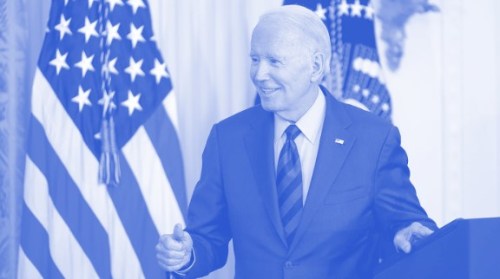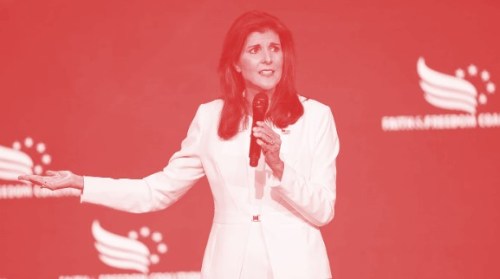Nevada Senate GOP field swells amid push to oust Jacky Rosen

Republicans are bracing for a crowded field in the Nevada Senate race to take on Sen. Jacky Rosen (D-Nev.) as the party looks to win back the majority in the upper chamber next fall.
While Senate Republicans landed their top recruit to take on Rosen — retired Army Capt. Sam Brown — that has not dissuaded several other GOP candidates from throwing their hat in the ring, with two doing so this week: Jeff Gunter, the former U.S. ambassador to Iceland, and retired Air Force Lt. Col. Tony Grady, who lost a primary bid for lieutenant governor in 2022. Former Nevada Secretary of State candidate Jim Marchant launched his campaign in May.
The growing number of candidates is complicating Senate Republicans’ efforts to avoid a messy GOP primary that would risk leaving the eventual nominee bruised going into next fall.
“People see what we all see: that Rosen is vulnerable. But it’s also a sign that there’s no clear front-runner. Brown has some D.C. institutional backing, but it’s not anything like it was two years ago for Laxalt,” one GOP operative with Nevada ties told The Hill, pointing to the lining up of support from the National Republican Senatorial Committee (NRSC) and top GOP senators.
“Sam’s got his work cut out for him,” the operative continued. “He’s going to have to work for it. It’s not going to be a coronation.”
Republicans are eager to oust Rosen, whose seat is considered a key pickup opportunity for the GOP as it looks to flip the Senate majority.
The Senate Republicans’ campaign arm has changed its approach this cycle and started to recruit candidates in key swing states, like Nevada and West Virginia, after the committee’s hands-off approach spurred issues of candidate quality for Republicans, costing them in competitive races.
Brown ran for Nevada Senate last cycle, before later losing to Republican Adam Laxalt in the GOP primary. Laxalt narrowly lost to Sen. Catherine Cortez Masto (D-Nev.) last fall.
But Senate Republicans are starting to coalesce around Brown this cycle. Sen. Steve Daines (R-Mont.), the NRSC’s chairman, has all but endorsed Brown in name, saying in a statement upon his launch that he was “very pleased” to see the Army vet in the race. Members of Senate GOP leadership — Sens. John Thune (R-S.D.) and John Barrasso (R-Wyo.) — have also backed Brown’s candidacy.
“I think one of the reasons you’ll probably see in the end local and national people rally around Sam Brown is, you don’t want a candidate who’s going to hurt you in that race,” explained Zachary Moyle, former executive director for the state GOP.
But Brown’s candidacy hasn’t stopped others from entering the primary field. In addition to campaigns launched by Grady, Gunter and Marchant, several other Republicans have launched long-shot bids for the seat. Some Republicans worry the crowded field could leave the party divided heading into the general election.
“Republicans are not coming out of these primaries unified. They’re generally coming out of these primaries very splintered, and that splintering, as much as how people perceive the candidate, has been a huge problem,” Moyle said.
A second GOP operative with Nevada ties specifically argued Gunter is the only candidate other than Brown with much of a shot of winning the primary, pointing to his unique ability of the candidates to self-fund his campaign. The operative gave Brown an 80 percent chance of winning, a 10 percent chance to Gunter, and the other 10 percent to “chaos,” referring to potential Democratic meddling to get Marchant across the finish line.
However, the hill to climb for both of the new candidates is high. Gunter, a Republican donor, is a California native who was registered to vote there until 2021 and made hundreds of thousands of dollars in donations to groups and candidates from a California address. His dermatology private practice also originated in California before opening offices in Nevada.
Gunter is also expected to push hard for former President Trump’s endorsement and align himself closely with him, having appeared at Trump’s Bedminster, N.J., speech after being indicted for his alleged mishandling of classified documents. Trump has yet to offer any endorsements in competitive Senate GOP primaries this cycle as he seeks the White House again.
As for Grady, he came in second for the GOP nod to become lieutenant governor last year, but operatives believe he does not have an adequate network or base to win a statewide battle — with his campaign launch event that attracted fewer than two-dozen attendees serving as an example.
Democrats are eager to see a messy GOP primary play out in the Silver State as they work to defend twice the number of Senate seats as Republicans.
“All of these Republican candidates carry disqualifying vulnerabilities and positions that are out-of-step with Nevada voters. This messy intraparty fight will leave their ultimate nominee damaged,” said Amanda Sherman Baity, spokeswoman for the Senate Democrats’ campaign arm in a statement.
At the same time, Republicans are clear-eyed that dethroning Rosen, who starts the third fundraising quarter this year with roughly $7.5 million cash on hand, will be no easy feat. As the second GOP operative noted, trying to attack Rosen on anything outside of being too liberal or attempting to tie her to Biden is a chore in of itself as there is little to pick apart about her personally.
“Rosen’s tough. … There’s nothing [to attack her on],” the operative noted, pointing specifically to the struggles incurred by former Sen. Dean Heller’s (R-Nev.) team when messaging against Rosen in 2018. “This lady is just a nice old lady that worked in a synagogue.”
Added to the mix is a rise in the state’s percentage of voters identifying as nonpartisan. About 24 percent of active voters in the state identified as nonpartisan, compared to 37 percent who identified as Democrat and 32 percent who identified as Republican, according to November 2020 data released by the Nevada Secretary of State’s office.
But those numbers have jumped since then, with 32 percent of active voters identifying as nonpartisan as of last month, compared to 32 percent identifying as Democrat and 29 percent identifying as Republican.
However, they do see some ways of squeezing support in segments of the state and are looking to the success of Nevada Gov. Joe Lombardo (R) as an avenue to do so. The operatives specifically noted two areas where the sitting governor ran stronger than Laxalt: with nonpartisan women (the second operative pointed out that Lombardo outran Laxalt by 10 points with that bloc) and with nonwhite working-class voters in Clark County (home to Las Vegas).
“Lombardo won that race by competing hard in Clark. Laxalt neglected Clark in comparison,” the first operative said. “You have to do better with working-class nonwhites there.”
Overall, Republicans say the time is now to shift their strategy and better support their candidates, or risk losing another winnable election. Assuming Brown wins the primary, some strategists believe selling him to voters gives the GOP a better chance at toppling Rosen than going overwhelmingly negative.
“The playbook’s too old and we need to update it,” Moyle said. “It’s time to run some new plays.”
Copyright 2023 Nexstar Media Inc. All rights reserved. This material may not be published, broadcast, rewritten, or redistributed.





